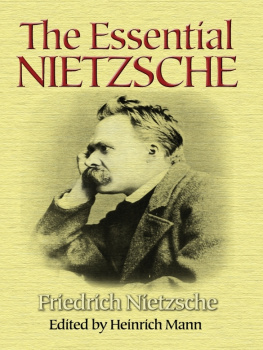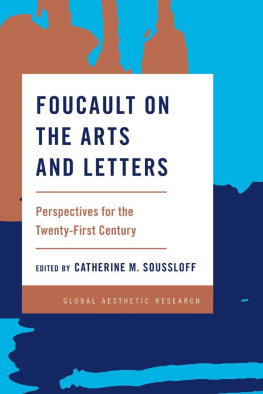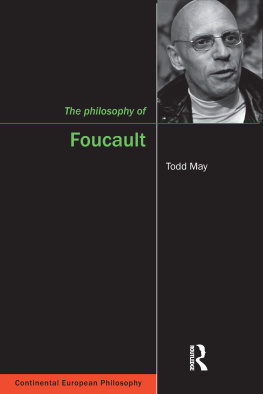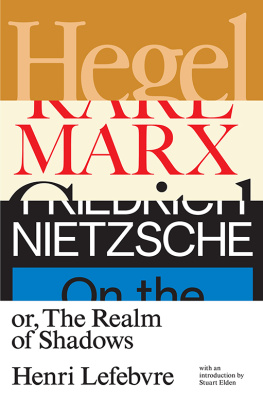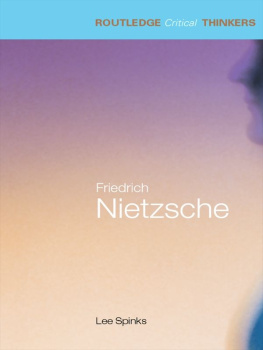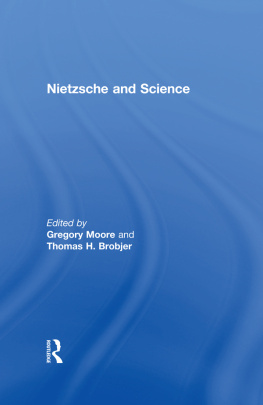Foucault and Nietzsche
Bloomsbury Studies in Continental Philosophy
Presents cutting-edge scholarship in the field of modern European thought. The wholly original arguments, perspectives and research findings in titles in this series make it an important and stimulating resource for students and academics from across the discipline.
Breathing with Luce Irigaray, edited by Lenart Skof and Emily A. Holmes
Deleuze and Art, Anne Sauvagnargues
Deleuze and the Diagram: Aesthetic Threads in Visual Organization, Jakub Zdebik
Derrida, Badiou and the Formal Imperative, Christopher Norris
Desire in Ashes: Deconstruction, Psychoanalysis, Philosophy, edited by Simon Morgan Wortham and Chiara Alfano
Early Phenomenology, edited by Brian Harding and Michael R. Kelly
Egalitarian Moments, Devin Zane Shaw
Ernst Bloch and His Contemporaries, Ivan Boldyrev
Jean-Paul Sartres Anarchist Philosophy, William L. Remley
Why There Is No Poststructuralism in France, Johannes Angermuller
Gadamers Poetics: A Critique of Modern Aesthetics, John Arthos
Heidegger, History and the Holocaust, Mahon OBrien
Heidegger and the Emergence of the Question of Being, Jess Adrin Escudero
Hegel and Resistance, edited by Rebecca Comay and Bart Zantvoort
Husserls Ethics and Practical Intentionality, Susi Ferrarello
Immanent Transcendence: Reconfiguring Materialism in Continental Philosophy, Patrice Haynes
Language and Being, Duane Williams
Merleau-Pontys Existential Phenomenology and the Realization of Philosophy, Bryan A. Smyth
Mortal Thought: Hlderlin and Philosophy, James Luchte
Nietzsche and Political Thought, edited by Keith Ansell-Pearson
Nietzsche as a Scholar of Antiquity, Helmut Heit
Philosophy, Sophistry, Antiphilosophy: Badious Dispute with Lyotard, Matthew R. McLennan
The Poetic Imagination in Heidegger and Schelling, Christopher Yates
Post-Rationalism: Psychoanalysis, Epistemology, and Marxism in Post-War France, Tom Eyers
Revisiting Normativity with Deleuze, edited by Rosi Braidotti and Patricia Pisters
Towards the Critique of Violence: Walter Benjamin and Giorgio Agamben, Brendan Moran and Carlo Salzani
Foucault and Nietzsche
A Critical Encounter
Edited by Alan Rosenberg and Joseph Westfall
Bloomsbury Academic
An imprint of Bloomsbury Publishing Plc

Contents
The editors would like to thank a number of people whose participation, cooperation, and collaboration have made this work possible.
We would like to thank Sarin Marchetti, Alan Milchman, and Morris Rabinowitz for reading draft versions of the Introduction and making many helpful, insightful comments. Although any errors remain our responsibility, we owe much of what is good in the Introduction to Sarin, Morris, and Alan. We would also like to thank the University of HoustonDowntown for an Organized Research and Creative Activities grant, which funded a course release that made possible very valuable time free from other responsibilities at a crucial stage of this project. And we owe a debt of gratitude to everyone at Bloomsbury, but especially Frankie Mace, whose interest, attention, patience, and advice have helped us see the book through to completion.
Finally, and most importantly, however, we would like to thank each of the contributors to this volume. Your work on Nietzsche and Foucaultboth here and elsewherehas deeply informed our understanding of both thinkers. You are among the very best, as scholars and as colleagues, and we are happy to have had the opportunity to work with and learn from each one of you.
Alan Rosenberg and Joseph Westfall
I am simply a Nietzschean, and try as far as possible, on a certain number of issues, to see with the help of Nietzsches textsbut also with anti-Nietzschean theses (which are nevertheless Nietzschean!)what can be done in this or that domain. I attempt nothing else, but that I try to do well.
Despite the obvious interrelation between Michel Foucault and Friedrich Nietzscheas well as the fact that many of the same individuals who have pursued a study of one of them in depth have, at some point or another, likewise studied the otherit remains the case that there are relatively few comparative scholarly assessments of Nietzsche and Foucault (relative, that is, to the overwhelming quantity of works written on either Foucault or Nietzsche). There are occasional journal articlesincluding the recent work of some of the authors gathered heresuch as those by Keithor readers new to either or bothinterested in Foucaults Nietzscheanism, Nietzsches intellectual influence on Foucault, or the crucial and fruitful differences between Foucault and Nietzsche that force us to read neither one nor the other, but both, together, always.
To approach the space between Foucault and Nietzsche, where they both might stand, and to articulate one perspectivetheir ownin the interstice, is a formidable task, but one each of the authors whose work is collected here has managed in an exemplary fashion, not only in this volume but in their prior work as well. The work is a collaborative one, to be sure, but a collaboration that is no less surely characterized on occasion by disagreementas both Nietzsche and Foucault would have it. If Nietzsche is right that knowledge, as it were. None of us will resolve the question of the precise nature of Foucaults relationship to Nietzsche once and for all, here or elsewhere; that question likely cannotperhaps even should notbe resolved once and for all. But the most fruitful philosophical engagements are seldom those that solve all the problems; they are, in fact, whether the work of one or multiple authors, those that help the reader to identify the best, most troubling, most enduring questions.
In this volume, such questions abound.
There is no escaping the conclusion that, of all the philosophical and literary influences on the work of Michel Foucault, one of the most striking, the most intriguing, the most lasting, as well as the most challenging is the work of Friedrich Nietzsche. Readers of Nietzsche and Foucault, both within the Continental philosophical tradition and without, can catalog the many overlapping interests, the comparable styles and ways of thinking, the preoccupation with similar problems and questions. Such a catalog would be interesting and useful. But if the goal were simply to see the impact and influence of Nietzsche on Foucault, it is unnecessary: one only need to read Foucault. In his writings, Foucault not only mirrors and parallels Nietzschean themes and conclusions: he explicitly takes them up, telling us he is doing so, and encourages us in the belief that his project has an interesting and important relationship to Nietzsches. Most directly, in his essay Nietzsche, Genealogy, History, Foucault adapts and adopts Nietzsches singular notion of genealogy to his own twentieth-century purposes, producing not only one of the most provocative readings of Nietzsche to that point, but revising and revitalizing Nietzschean genealogy into a distinctly Foucauldian notion. There are numerous examples of philosophical influence in the history of European thoughtfrom Plato and Aristotle to Aristotle and Aquinas, Descartes and Husserl to Husserl and Heideggerbut few provide us with such an intricate and enthusiastically embraced constellation of overlappings, disagreements, appropriations, and revisions as does the case of Nietzsche-influencing-Foucault/Foucault-reading-Nietzsche.


